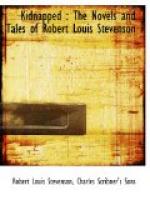“I have nae clear mind about his coat,” said Alan cunningly, “but it sticks in my head that it was blue.”
“Blue or black, did ye know him?” said I.
“I couldnae just conscientiously swear to him,” says Alan. “He gaed very close by me, to be sure, but it’s a strange thing that I should just have been tying my brogues.”
“Can you swear that you don’t know him, Alan?” I cried, half angered, half in a mind to laugh at his evasions.
“Not yet,” says he; “but I’ve a grand memory for forgetting, David.”
“And yet there was one thing I saw clearly,” said I; “and that was, that you exposed yourself and me to draw the soldiers.”
“It’s very likely,” said Alan; “and so would any gentleman. You and me were innocent of that transaction.”
“The better reason, since we were falsely suspected, that we should get clear,” I cried. “The innocent should surely come before the guilty.”
“Why, David,” said he, “the innocent have aye a chance to get assoiled in court; but for the lad that shot the bullet, I think the best place for him will be the heather. Them that havenae dipped their hands in any little difficulty, should be very mindful of the case of them that have. And that is the good Christianity. For if it was the other way round about, and the lad whom I couldnae just clearly see had been in our shoes, and we in his (as might very well have been), I think we would be a good deal obliged to him oursel’s if he would draw the soldiers.”
When it came to this, I gave Alan up. But he looked so innocent all the time, and was in such clear good faith in what he said, and so ready to sacrifice himself for what he deemed his duty, that my mouth was closed. Mr. Henderland’s words came back to me: that we ourselves might take a lesson by these wild Highlanders. Well, here I had taken mine. Alan’s morals were all tail-first; but he was ready to give his life for them, such as they were.
“Alan,” said I, “I’ll not say it’s the good Christianity as I understand it, but it’s good enough. And here I offer ye my hand for the second time.”
Whereupon he gave me both of his, saying surely I had cast a spell upon him, for he could forgive me anything. Then he grew very grave, and said we had not much time to throw away, but must both flee that country: he, because he was a deserter, and the whole of Appin would now be searched like a chamber, and every one obliged to give a good account of himself; and I, because I was certainly involved in the murder.
“O!” says I, willing to give him a little lesson, “I have no fear of the justice of my country.”
“As if this was your country!” said he. “Or as if ye would be tried here, in a country of Stewarts!”
“It’s all Scotland,” said I.
“Man, I whiles wonder at ye,” said Alan. “This is a Campbell that’s been killed. Well, it’ll be tried in Inverara, the Campbells’ head place; with fifteen Campbells in the jury-box and the biggest Campbell of all (and that’s the Duke) sitting cocking on the bench. Justice, David? The same justice, by all the world, as Glenure found awhile ago at the roadside.”




